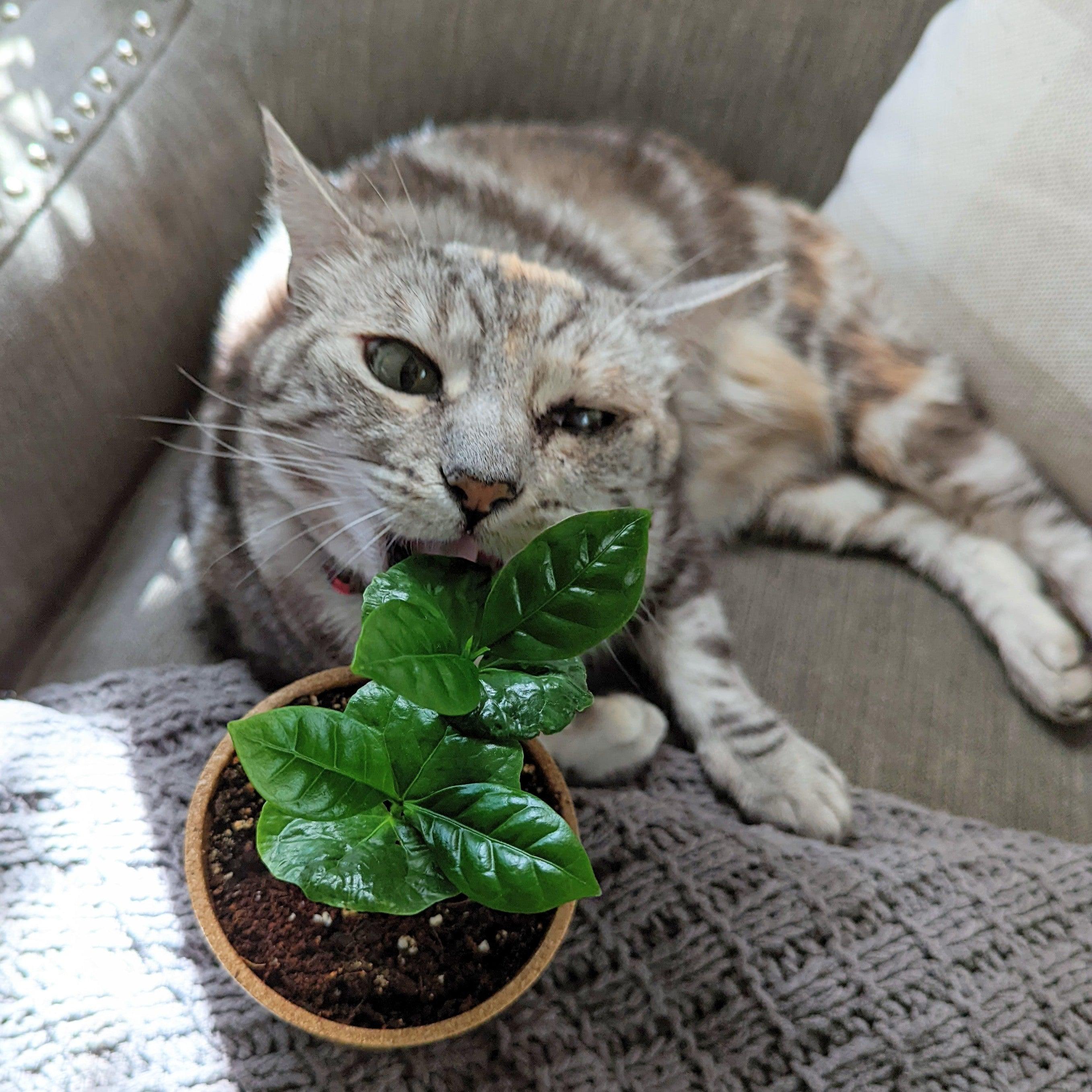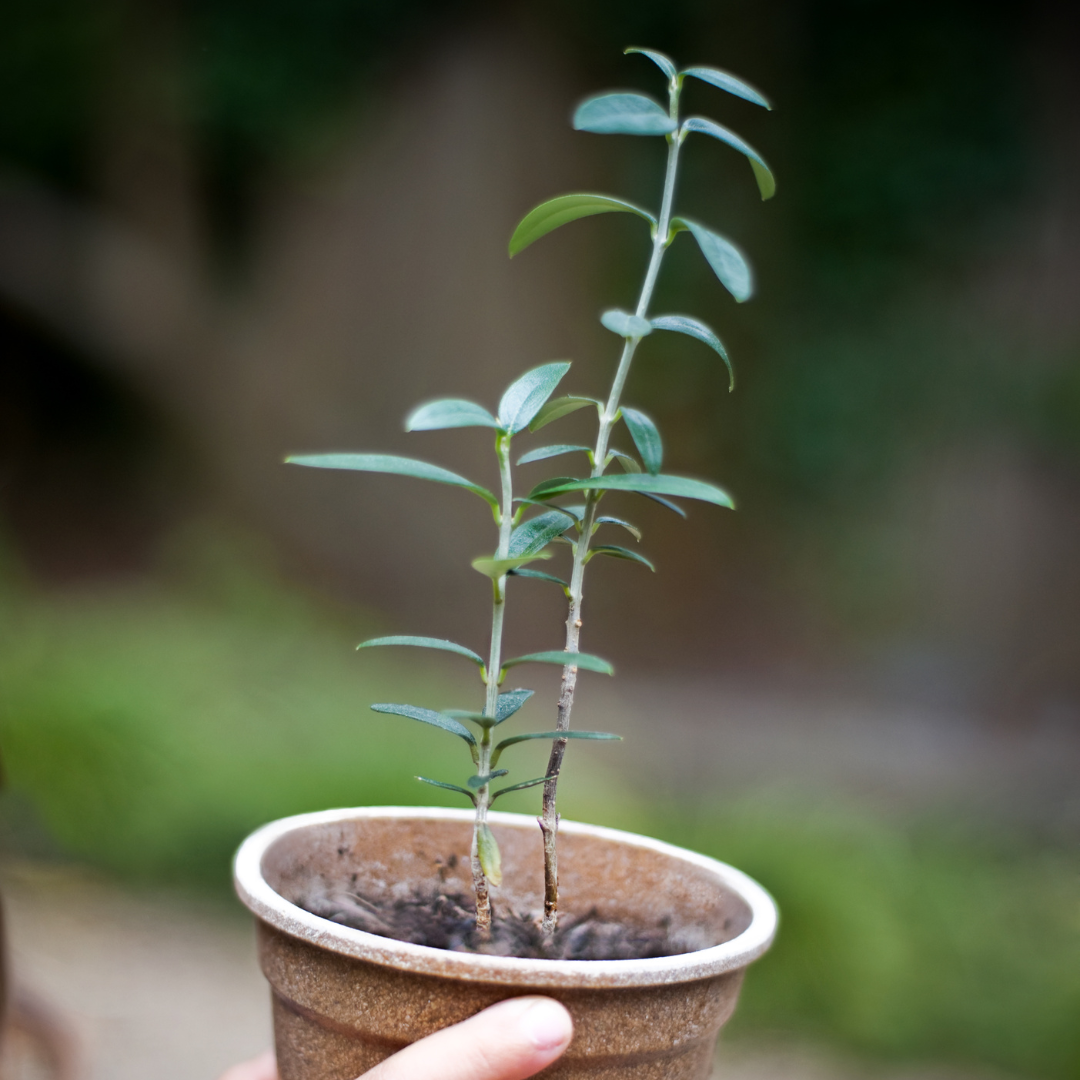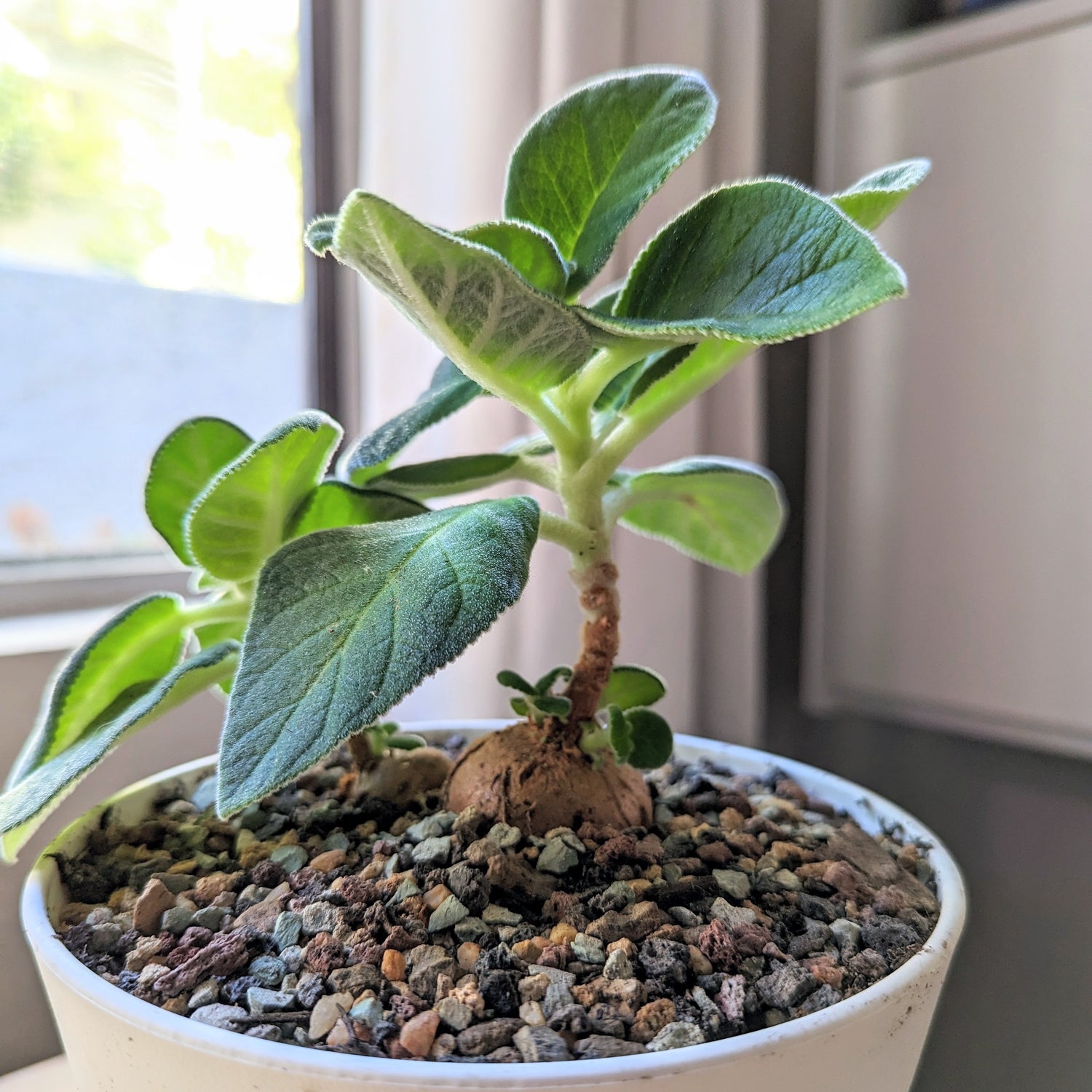If you have pets, especially pets like our little Maia who love to chomp down on houseplants, then you of course want to make sure the plants you have around (or within their reach) are non-toxic to them!
This list is for ornamental plant varieties, so while they are considered non-toxic, you definitely shouldn't be allowing your pets to eat these varieties(in fact, our cat ate a bunch of China Doll plant leaves just the other day and ended up vomiting all morning...).
If you're interested in growing a little garden for your pets, trying growing things like Petgrass or Catnip, which you can give to your fur babies as little snacks and to aid their digestion!
That little warning aside, here's our list!
1) Polka Dot Plants

Hypoestes or Polka Dot plants are smaller spotted houseplants are easy to grow from seed, fast growers, and are easy to care for. Keep them well-watered and provide them with bright, indirect light!
They come in different colors(pink, white and red) and leaf patterns(sanguinolenta or confetti, and phyllostachya or splash).
These seeds, along with a few of the other seeds in this list, are in our Pet-friendly houseplant seed collection.
[you can get Polka Dot plant seeds here!]
2) Ponytail Palm

Beaucarnea Recurvata or Ponytail Palms are a unique plant variety grows a bulbous stem that stores extra water and nutrients, classifying it as a Caudex plant variety. The seeds are beginner-intermediate level to germinate.
They don't need a very specific setup to successfully germinate, but they do take a little longer(close to a month) to finally sprout. Keeping the seedlings and plants alive is not tricky. These plants love light but don't need much water. I actually germinated some last year, forgot about them for about 6 months where I maybe watered them twice, left them under some grow lights and miraculously, they survived!
These are slow growers, the more light you can offer them, the faster they will grow. Ponytail Palms are also in our Pet-Friendly Houseplant Seed Collection!
[you can find Ponytail Palm seeds here!]
3) African Violet

African Violets are a classic flowering houseplant. They are very easy to care for, flower easily indoors, and come in all kinds of different colors and patterns.
The seeds are advanced-level to germinate because of their tiny size, but with the right setup, they're reliable and relatively quick to germinate. They do take a lot of time to get past the seedling stage since they start out so tiny- just keep them moist and brightly lit, and fertilize occasionally to give them an extra boost!
[can you find the teeny african violet sprouts in the photo?]

You'll find our Standard African Violet seeds in the Pet-friendly houseplant seed collection, but we also carry Variegated, Fantasy and Lil Gems African Violet seeds.
[you can find all of our African Violet seeds here!]
4) Fatsia Japonica

Fatsia Japonica aka Japanese Aralia is known as the Pet-friendly Monstera Deliciosa alternative. While they don't have the same split-leaf shape, they have a very similar growth pattern, growing tall and wide with large, lush leaves.
Like the Monstera, these plants are low-maintenance and grow relatively quickly, making them the perfect beginner plant. The seeds are intermediate-level difficulty to germinate, but it gets easier from there!
Provide the seedlings with good moisture and lighting(from grow lights or a windowsill with bright, indirect sun) and within a few months you'll have one(or twenty) lush Japanese Aralia plants.
[you can find Japanese Aralia seeds here!]
5) Fire Flash Plant

Chlorophytum Amaniense, or the Fire Flash Plant, also known as the Mandarin Plant, is a very underrated houseplant variety. These are cousins to the Spider plant(they're both Chlorophytum plant varieties), but instead of growing thin, striped leaves, these produce thicker lush green leaves with fire-y orange stems.

The seeds are intermediate difficulty, but similar to the other plants on this list, care gets easier once the seeds germinate. I've personally found a lot of success tissue germinating Chlorophytum seeds, with 100% germination rates almost every time, but they have very reliable germination rates with the classic greenhouse method.
[you can find Fire Flash Plant seeds here!]
6) China Doll Plant

The Radermachera Sinica, also known as the China Doll Plant, is a little different than your classic big houseplant. A lot of the tropical varieties out there and on this list produce these big, beautiful, lush leaves, whereas the China Doll plant looks a little more like your typical deciduous tree with smaller leaves(they remind me a little of Birch foliage).
These plants produce seeds that are beginner-intermediate difficulty to germinate that grow into quick-growing and relatively low maintenance plants.
The biggest downside to China Doll plants are the pests- they're very susceptible to all kinds of pests. In my own collection, most plants will be fine, but my one China Doll will be infested with scale, mealy bugs, aphids and thrips.
You really do need to keep an eye on those pests before they get out of control, but on the upside, these are resilient plants and if you have to cut back a lot of foliage, it will grow back relatively quickly.
These seeds are also available in our Pet-Friendly Houseplant Seed Collection.
[you can find China Doll Plant seeds here!]
7) Lithops
Let's cover some succulents! Lithops, also known as Living stones, come in endless colors and patterns, which just makes them that much more fun to collect. They are non-toxic to pets, however I doubt any pet could even get a mouthful of these little oddities since they literally do just resemble rocks.

These seeds, like the African Violets, are tiny which already makes them advanced-level seeds to germinate. They are a little more finicky about their setup in general, so keep the planter sealed well with a dome of some sort(a really good seal is necessary here!) and make sure to see condensation on the humidity dome. They need consistently high temperatures and good lighting to sprout and grow well.
As plants they're pretty low maintenance but just make sure you don't overwater them and give them a nice, rocky substrate.
[you can find Lithops seeds here!]
8) Baby Toes
Fenestraria Aurantiaca, aka Baby Toes, are another odd little succulent. They produce these stems that look, well, like baby toes, or maybe some kind of odd alien growth.

In terms of their seeds, they're very similar to Lithops, both have tiny seeds that are trickier to germinate and get to survive to seedling-hood. They need those moist conditions to germinate and for the sprouts to grow larger, but once they get to a certain size, it's important to start watering them less and only when the soil really dries out.
It's a tricky balance to find, if you underwater the seedlings they'll die, if you overwater them, they'll also die(I can't tell you how many I've killed at this point!), but once you figure out the schedule for your seedlings they'll just keep growing.
[you can get Fenestraria Aurantiaca seeds here!]
9) Kentia Palm

Howea Forsteriana, or Kentia palms, are the most difficult seeds in our collection to germinate! These seeds can take up to a year to germinate, which is more than any other seeds in our collection by a long-shot! Granted this does depend very much on the setup, like with a lot of other seeds, for instance I've had some Bird of Paradise seeds germinate in 6 months in a less than ideal situation, and in proper greenhouse setups they'll sprout in less than 1 month.
Kentia palms are slow growers at every stage, from germination, to seedling-hood and eventually to plant adulthood. That being said, they are extremely popular, lovely and low-maintenance indoor palms.
[you can find Kentia Palm seeds here!]
10) Pygmy Date Palm

Phoenix Robelenii, also known as the Pygmy Date Palms, are commonly grown as houseplants as well as landscaping plants in warmer regions(like San Diego! I see them everywhere here).
Most palms seeds tend to have the harder outer shells that make them trickier to germinate(but they do tend to store well!) and that usually also means they take weeks-months to germinate. Pygmy Date Palms are one of the trickier palm varieties to germinate- I have personally yet to succeed germinating them without pre-soaking which is a step other varieties don't necessarily require but definitely benefit from.
In other words, these seeds need to be pre-soaked, ideally also scarified, then planted in a sealed greenhouse environment on a heat mat with high temperatures(>70F but ideally 75-85F) and under grow lights or some other bright light source out of direct sun.
They are a low maintenace plant and bring a very tropical vibe into any space.
[you can find Pygmy Date Palm Seeds here!]

Get our Pet-Friendly Houseplant Seed Collection!
$24.29 [includes a 5% discount for buying all the seeds as a collection]
Seeds included:
- Hypoestes Phyllostachya 'Pink Splash' Polka Dot Plant Seeds
- Hypoestes Sanguinolenta 'White Confetti' Polka Dot Plant Seeds
- Radermachera Sinica 'China Doll Plant' Seeds
- Standard African Violet Seeds
- Beaucarnea Recurvata 'Ponytail Palm' Seeds





